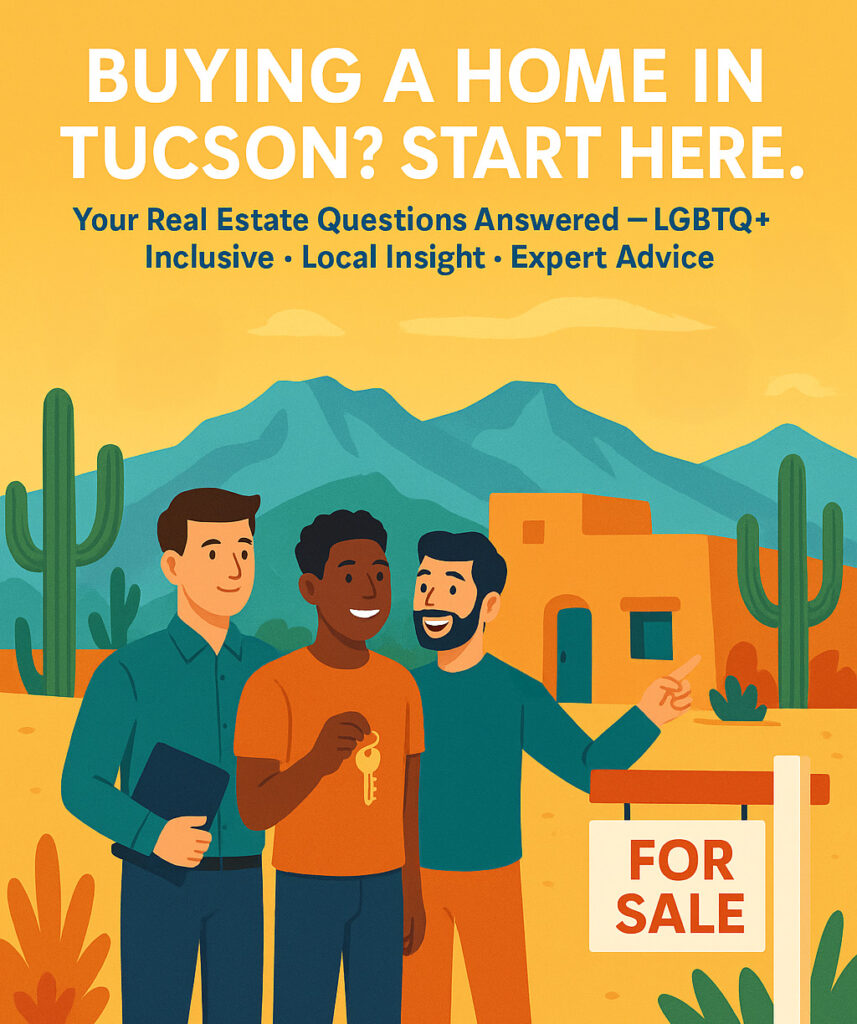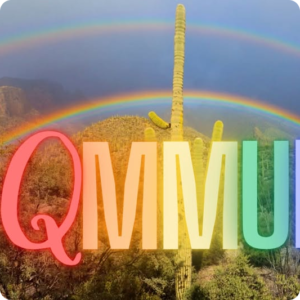🌟 Welcome to the GayTucson Real Estate Buyers Frequently Asked Questions (FAQs)
Whether you’re buying your first home, relocating to the desert, or just exploring your options, the Tucson real estate market offers incredible opportunities — and a few important things to know before making a move.
This page is dedicated to LGBTQ+ homebuyers in Tucson and anyone seeking expert, affirming guidance in their home search. Backed by up-to-date data and decades of local experience, these FAQs are designed to answer your top questions about buying real estate in Tucson in 2025.
At GayTucson.com, this resource was created with insight from Tony Ray Baker, a top Tucson Realtor and the site’s founder. With Tony Ray’s guidance, you’ll get honest answers, strategic advice, and a friendly voice to help you every step of the way.
📚 Featured Resources for Tucson Homebuyers
Before we jump into the FAQs, here are a few essential reads to help you get to know Tucson and the real estate landscape:
- Cost of Living in Tucson vs Other U.S. Cities
- Does Tucson Have Enough Water? What Buyers Should Know
- Tucson: A Haven of Outdoor Adventure
- Top Walkable Neighborhoods in Tucson
- Trans-Inclusive Buying Tips
🌵 GayTucson Real Estate FAQs for Buyers
It depends on your budget, but the short answer is: more so than many cities. Tucson’s median home price sits around $325K (down slightly YoY), and while that’s up from years past, it’s still lower than places like Phoenix, L.A., or Denver. Only 38% of homes are currently affordable to median-income families, down from 64% in 2021, so plan smart and act fast. Bonus tip: Down payment assistance programs are available for first-time buyers. Let’s get you pre-approved and get you started!
Whew! It’s not the 2021 Hunger Games anymore. Tucson’s market has “rebalanced.” Homes are now averaging 50–62 days on the market, and most sell for 97–98% of list price. You’ve got negotiating power! You can often ask for repairs, seller concessions, or even a 2-1 mortgage rate buydown, just like the pros.
For walkable, artsy, and inclusive vibes, try Armory Park, Sam Hughes, or West University — close to downtown, drag brunches, and community events. For more suburban feels with room to grow a family (or a cactus collection), check out Civano, Rita Ranch, or Oro Valley. And remember: we can tour virtually too, so if you’re not in town, we’ve still got you covered.
Totally — especially for first-time buyers or folks looking to downsize. Condo prices spiked about 15% in 2023 (median ~$287K), but they’re still more affordable than single-family homes. Bonus: Less yard work and often close to nightlife, restaurants, and Pride parades. 🌈 Just watch for HOA fees and check the community’s vibe.
If you want modern, energy-efficient living, the 700+ new construction homes available in Tucson might be perfect. Popular areas include Vail, Marana, and Star Valley. Builders are offering perks like closing cost help and mortgage buydowns, and many homes come with smart tech and solar-ready setups, great for staying cool and saving green.
$350K can still go a long way in Tucson — think 3-bedroom, 2-bath homes in solid neighborhoods. You’ll find well-kept homes in Midvale Park, Rita Ranch, or maybe a cute townhome near 4th Avenue. Not fancy enough? If you’re willing to look a bit further out (like Vail or Sahuarita), you might score a new build with granite countertops and a walk-in closet big enough for your entire wardrobe.
It depends on your timeframe. With rents around $1,100–$1,300, it may be cheaper in the short term — but owning builds equity. If you’re staying 5+ years, buying almost always wins. Just know that your mortgage (at today’s rates) could be closer to $2,000/month. If you’re unsure, let’s crunch the numbers together.
Thankfully, Tucson is one of Arizona’s most inclusive cities. We’re a designated LGBTQ+ Safe Zone, and local realtors (like me!) are trained and committed to equality. Still, it’s smart to work with an agent who truly understands your needs, whether that’s finding a trans-friendly neighborhood or a home perfect for hosting Sunday tea. 🏳️🌈
Higher rates (currently around 6–7%) reduce how much house you can afford. If you could afford $400K at 3%, you might only qualify for $300K now. Ouch, right? But don’t worry — rate buydowns or ARMs (adjustable-rate mortgages) can help, and if rates drop later, refinancing is an option. Let’s plan ahead!
Spring (Feb–May) is busy — more listings, more competition. Summer is slower (hello, 105° heat), but that means less buyer competition and sometimes better deals. If you’re moving from out of town, winter is beautiful and popular for snowbirds. Pro tip: If you’re flexible, buying in summer could save you money.
Buyers today have more negotiating power than during the pandemic surge. Most homes are selling for 2–3% below asking price, and it’s now common for buyers to request repairs, home warranties, or closing cost assistance. In a balanced market like Tucson’s, it’s important to negotiate based on comparable recent sales, not just list price.
As of spring 2025, homes in Tucson are averaging 50–62 days on the market. That’s a notable shift from the rapid sales of 2021. This gives buyers more time to make informed decisions, schedule inspections, and avoid rushed offers. Well-priced homes still tend to move faster.
Buyers moving to Tucson often explore neighborhoods that reflect their lifestyle. Armory Park and Sam Hughes attract those who enjoy historic homes and walkable districts near the university and downtown. Families often gravitate toward Oro Valley, Rita Ranch, or Marana, while retirees may favor Green Valley or SaddleBrooke. For those seeking scenic luxury, the Catalina Foothills is consistently in demand.
Tucson’s desert climate makes certain home features especially valuable. Look for central air conditioning, dual-pane windows, solar panels, and energy-efficient HVAC systems. These can reduce utility costs, especially during the summer. It’s also wise to ask about roof condition and monsoon drainage, as heavy rains can be an issue during the summer season.
Inventory has improved since the ultra-tight market of 2021–2022. As of May 2025, Tucson has about a 3.4-month supply of homes, not quite a buyer’s market, but more balanced than in recent years. There’s still strong demand, especially for homes priced below the median, so acting promptly when the right home appears is still important.
Tucson offers relatively low property taxes, which helps with overall affordability. The average effective property tax rate is approximately 0.7–0.8% of assessed value — below the national average. This is especially appealing to out-of-state buyers relocating from higher-tax states like California or Illinois.
Absolutely. Tucson is known for its inclusive and welcoming environment, with a vibrant LGBTQ+ community and active Pride events. Neighborhoods like West University, Dunbar Spring, and Armory Park are popular with LGBTQ+ residents. In addition, working with LGBTQ+ affirming agents and lenders helps ensure a respectful and informed buying experience.
After significant growth between 2020–2022, prices have largely stabilized. In early 2025, the median sale price is around $325,000, slightly down year-over-year. Forecasts suggest modest price increases ahead — around 4–5% annually — making now a strategic time to buy before the next uptick.
Tucson is generally more affordable than Phoenix. Median list prices in Tucson are around $350K–$380K, whereas Phoenix often exceeds that. Tucson also tends to have less traffic, a more laid-back atmosphere, and lower property taxes, making it especially appealing for retirees, remote workers, and families seeking more value.
Yes — especially if you’re looking for affordability and lower maintenance. Tucson condos and townhomes had a median price of around $287,000 in 2023 and saw 15% price growth, indicating strong demand. These properties are ideal for buyers who want a move-in-ready home near amenities without the upkeep of a larger yard or house. Just be sure to factor in HOA fees and review the financial health of the association.
Tucson is still considered one of the more accessible housing markets in the Southwest, but affordability has tightened. In 2021, 64% of homes were affordable to median-income families; by 2023, that figure had dropped to 38.2%. First-time buyers should explore down payment assistance programs, get pre-approved for financing, and work with a knowledgeable local agent who can help identify the best value neighborhoods.
Yes. Arizona offers several state-level initiatives, such as through the Arizona Industrial Development Authority, and local nonprofits in Tucson also provide homebuyer education and financial assistance. These can be especially helpful for buyers with limited savings or moderate incomes.
New construction homes often include energy-efficient systems, modern layouts, and lower maintenance. Tucson currently has over 700 new homes on the market, particularly in Vail, Star Valley, and Marana. However, buyers should consider potential trade-offs like higher HOA fees or longer commutes to central amenities. Always ask about additional tax assessments, such as Community Facilities District (CFD) bonds, which can raise property taxes in newer areas.
It depends on your lifestyle and priorities. If you want historic charm and proximity to nightlife, consider Sam Hughes or Armory Park. For newer homes and family-friendly environments, look at Oro Valley, Rita Ranch, or Sahuarita. If mountain views and privacy are priorities, the Catalina Foothills is a popular choice. A local agent can help you compare commute times, school zones, and amenities to find the best fit.
Very much so. With many buyers relocating from out of state, Tucson agents are experienced in handling virtual showings, video walkthroughs, and e-signings. If you’re buying remotely, make sure you work with a tech-savvy agent and consider a home inspection via video call or appointing someone local to attend on your behalf.
Tucson’s hot summers mean air conditioning is essential and can drive up utility costs. Energy-efficient homes, particularly those with solar panels, good insulation, and dual-pane windows, can reduce monthly expenses. Ask sellers for past utility bills if possible, and inquire about solar incentives or system ownership if the home has solar installed.
The investor share of purchases in Tucson hovers around 10–15%, which can create competition, especially for entry-level homes. The good news: fewer investors are offering all-cash now due to higher rates. Strengthen your position with a mortgage pre-approval, a competitive offer, and limited contingencies when appropriate. Seller concessions are more common today than in 2021, so you still have leverage.
Interest rates have risen from historic lows (~3%) to around 6–7%, impacting monthly payments. While it’s tempting to wait, timing the market is tricky. Many buyers are purchasing now and planning to refinance later if rates decline. If you find the right home that fits your budget and goals, it may make sense to buy now rather than risk rising prices later.
Buying a home is a personal journey, and it helps to work with someone who understands your needs and respects your identity. An affirming agent will offer guidance without assumptions and can help you find not just the right house, but the right community. Tucson’s LGBTQ+ community is active and visible, and we’re here to make sure your move feels like home from day one.
You’re likely ready when you have stable income, a clear idea of your budget, and a plan to stay in one place for at least 5 years. Buying a home in Tucson offers long-term benefits, from building equity to enjoying a sense of stability in a welcoming community. Work with a trusted local professional who can walk you through the process step-by-step, and take the time to understand your goals.
🏁 Ready to Make Your Move? Let Tony Ray and the Team Guide the Way.
Buying a home — especially in a new city — comes with a lot of questions. Having the right agent makes all the difference.
Tony Ray Baker has helped hundreds of buyers find their perfect home in Tucson. As a trusted real estate expert and proud member of the LGBTQ+ community, Tony Ray brings the experience, care, and local knowledge to guide you every step of the way — from your first showing to the final signature.
If any of the questions on this page resonated with you — or sparked new ones — the next step is easy:
👉 Call or text Tony Ray directly at (520) 631-TONY (8669) to get personalized guidance and real answers. Whether you’re just starting to think about buying or ready to list your home tomorrow, Tony Ray is here to help you make confident, informed decisions.
There’s no pressure — just a conversation with someone who knows Tucson inside and out, and who truly cares about helping you achieve your real estate goals.
📲 Let’s turn your questions into a plan. Contact Tony Ray today and start your Tucson real estate journey with someone you can trust.






